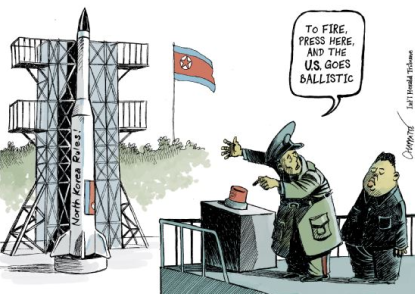Edited by Bora Mici

Whatever the regime in Pyongyang hopes to accomplish with this sharp escalation strategy, the Kim clan’s approach does not only affect the situation on the Korean Peninsula. The war cry has regional and geostrategic consequences, which, in the current situation, come back to the U.S. above all.
For quite some time, Washington has shifted its foreign policy focus to the Pacific Ocean. On the one hand, the U.S. aims to integrate an emerging China into an interest-led partnership and, on the other hand, of course also curb its power, in particular Beijing’s military “hard power.” North Korea currently provides the U.S. with the best excuse to move military equipment into the region, which can then also be used against the Chinese People’s Liberation Army.
The potential threat in Pyongyang is still manageable. However, the opposition in Beijing, where the defense budget has grown by the double digits for years, can be felt clearly already. China is angry with its communist brothers in North Korea because they now hold the door to the region wide open for the U.S. Beijing is important to the status quo, with North Korea acting as a buffer state between the Chinese border and the U.S.’ sphere of influence. If Kim Jong Un continues to play with fire, that all could change, and Kim, the calculating American-eater,* could waltz right into the hands of the U.S.
* Editor’s note: This term refers to someone who is Americanophobic and seems to originate with Herbert Bayard Swope’s book “Inside the German Empire In the Third Year of the War.”

Leave a Reply
You must be logged in to post a comment.